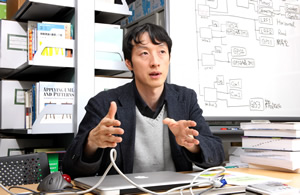2010/09/03
‚ÄúRobots as machines‚ÄĚ to provide human support
Associate Professor Taketoshi Mori (Department of Mechano-Informatics)

Associate Professor Mori researches robotics to support welfare of those who are in need for support such as the elderly.¬† The concept is very unique in that an entire room or an entire city is made of robots.¬† ¬†It focuses on ‚Äúrobots as machines‚ÄĚ to support humans which is different from human-shaped robots. ¬†Although the word ‚ÄĚmachine‚ÄĚ may sound like poor intelligence, his research is to embed intelligence into robots that read what the elderly want from their motion and proactively take actions.
There are no robots that walk on two legs or move on wheels in this ‚Äúrobotic room‚ÄĚ system.¬† In this system, machine (robot) hands hanging from the ceiling carry a container of commodities such as a cup and hand it over to whoever requested it. ¬†It is more efficient and easier to organize for the machine to carry a container with items rather than directly grabbing them. ¬†In other words, robots embedded into a room serve people in a room.
This research is based on a triangle strategy of ‚Äúenvironment,‚ÄĚ ‚Äúmotion recognition,‚ÄĚ and ‚Äúcontent‚ÄĚ ‚Äď 1) environmental infrastructure where robots can freely move around, 2) ability to move based on recognition of people‚Äôs want, daily habit, and behavior pattern in a room, and 3) service content of robots.¬† Associate Professor Mori specifically addresses the fields of human behavior modeling, motion recognition, and measurement. Active collaboration with researchers in other fields including mechanics, mathematical science, cognitive psychology, or ethics is also expected in order to further increase the prediction accuracy of robots. ¬†This effort is taking shape as human support.
Associate Professor Mori brings new perspectives to robotics research and says, ‚ÄúRobots are machines to shape the future society and support human activities.¬† It is a fascinating research field that allows us to contribute to society through engineering.‚ÄĚ

